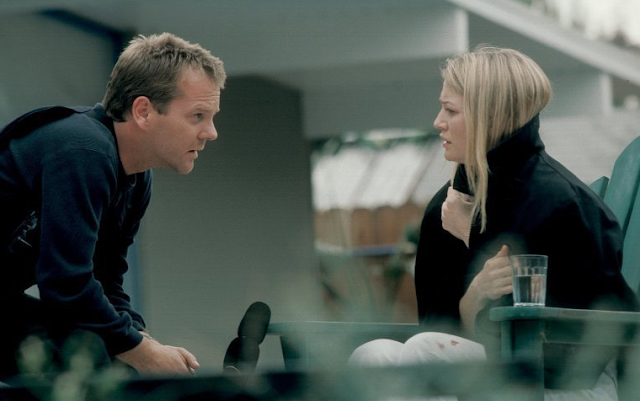'I'm going to need a hacksaw', Jack Bauer (Kiefer Sutherland) declares during episode one of 24's second season. It is not because he needs to do some D.I.Y. During season two's breathless opening, plot lines aren't just setup, they're created and embellished. It should be a lesson for the TV series of today on how to create dynasties and, whilst the pacing doesn't quite keep up to that level of hectic bewilderment throughout, there's little doubt that this is a clear candidate for the award of 'Best 24'.
Season two achieves that nomination by way of reaching for TV's holy grail and finding an affinity between the success and thrills of individual episodes and the same for the wider plot. Time and again, an hour of 24 feels exciting and revelatory in its own right, but there's always a burrowing happening in the background as we're taken deeper and deeper into Jack's world and the murky plot around nuclear weapons that manages to eschew Austin Powers overtones.
Newcomers to the cast Reiko Aylesworth (who of course goes on to play a big part in 24s to come) and Sarah Wynter play really well and feel well written, with Laura Harris adding yet another interesting female character to a TV genre both famously bereft of them and a TV show boasting one of the worst: yes, that's right, Kim (Elisha Cuthbert) still doesn't have a great deal to do beyond fluttering eyelashes and running away. Tony (Carlos Bernard) and, in particular, George (Xander Berkeley), go on very interesting journeys indeed.
Perhaps though, it is for something else that 24 season two will ultimately be remembered, and which will keep people coming back to it, to see how television dealt with off-screen events. Beginning in the US almost exactly a year after the events of 9/11, this is a series which takes a brave line in being unafraid to play on the US' terrorism fears. Having established a white, middle-class suspect, we do, of course, resort to an Asian stereotype, though not without going via more twists that hint at an affinity with some of the more interesting 'war on terror' background politics. Bauer, of course, the hero, is presented as working class throughout, a noble warrior, even if the bureaucrats have a tendency to send him out on ethically suspicious missions. On that note too, there's some interesting questions here for those who consider Zero Dark Thirty to condone torture, with the tactic used on more than once occasions, once my a very senior figure.
But with all of that, season two remains an incredibly fun example of how good TV can get when it accepts and embraces Thriller conventions and runs with them successfully. This is a season so full of twists Shyamalan would have a heart attack. The difference? This has the skill to make all of them successful, without compromising story or character. A joy to spend twenty-four hours with.



No comments:
Post a Comment